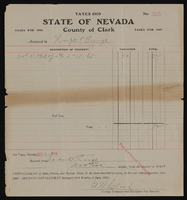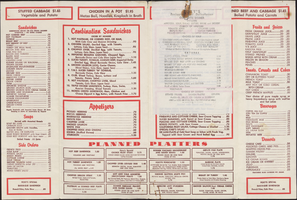Search the Special Collections and Archives Portal
Search Results
An Interview with Judith Lee Johnson Jones
Identifier
Abstract
Oral history interview with Judith Lee Johnson Jones conducted by Claytee D. White on February 22, 2007 for the Boyer Early Las Vegas Oral History Project. Johnson Jones discusses winning a contest that allowed her to be a showgirl at the Sands Hotel and Casino when she was seventeen, receiving a college degree in Houston, Texas, and performing in the Elvis movie “Viva Las Vegas.” She also talks about her twenty-nine-year career in education.
Archival Collection
Ethel S. Hatch oral history interview
Identifier
Abstract
Oral history interview with Ethel S. Hatch conducted by P. Kohlman on November 24, 1975 for the Ralph Roske Oral History Project on Early Las Vegas. This interview covers the history of Las Vegas from 1939 to 1975. Mrs. Hatch also talks about ranching in Nevada, Rex Bell, development on the Strip, the first hotels, and early local shopping culture. The interview concludes with discussion surrounding tree-lined streets, the Helldorado Club, and Fremont Street.
Archival Collection
Lee H. Lisby oral history interview
Identifier
Abstract
Oral history interview with Lee H. Lisby conducted by Glen E. Davis on July 10, 1975; Rita O'Brien on April 10, 1978; and Elizabeth Patrick on May 10, 1978 for the Ralph Roske Oral History Project on Early Las Vegas. In 1942, Lisby moved from Tallulah, Louisiana to Las Vegas, Nevada. Lisby talks about living conditions and work opportunities for African-Americans in Las Vegas.
Archival Collection
Jacqueline MacFarlane oral history interview
Identifier
Abstract
Oral history interview with Jacqueline MacFarlane conducted by Claytee D. White on February 04, 2010 for the Boyer Early Las Vegas Oral History Project. In this interview Jacqueline MacFarlane discusses her early childhood in Las Vegas, Nevada, her move to rural Nevada because of the Great Depression, her move back to Las Vegas, and meeting her husband David MacFarlane, an Air Force Cadet, at the Nellis Air force Base. She then discusses family life, Las Vegas in the 1950s and 1960s, and the various jobs she held on the Las Vegas Strip.
Archival Collection
Series I. The Caddo Company, Incorporated, 1922 to 1965
Level of Description
Scope and Contents
The Caddo Company, Incorporated series (1922-1965) is comprised of twelve sub-series containing film production and corporate records.
The first two sub-series contain materials related to two films that predate the formation of The Caddo Company, Incorporated as a production company,
Materials within each film sub-series include advertising and publicity, administrative, censorship, distribution, editing, financial, legal, and production and direction records, as well as film soundtracks and screenplays. Types of materials include of ledgers, correspondence, storyboard images, sheet music, and original scores, as well as film, direction, set, and production stills. Corporate records consist of newspaper clippings, administrative correspondence, actor and distribution contracts, and financial reports.
Archival Collection
Collection Name: Howard Hughes Film Production Records
Box/Folder: N/A
Archival Component
Edyth Hess Hoban oral history interviews
Identifier
Abstract
Oral history interviews with Edyth Hess Hoban conducted by Jane E. Olive on March 11, 2000 and May 23, 2000 for the UNLV University Libraries Oral History Collection. In this interview, Hoban discusses her early life in Scotland, South Dakota. She remembers the 1918 Influenza pandemic, her early interest in music, and becoming the band leader for the all-women orchestra, The Sophisticates. Hoban talks about moving to Las Vegas, Nevada in 1942, competing and winning in golf tournaments, and changes in Las Vegas golf courses.
Archival Collection
Joyce Bush oral history interview
Identifier
Abstract
Oral history interview with Joyce Bush conducted by Claytee D. White on September 20, 1995 for the UNLV University Libraries Oral History Collection. In this interview, Bush discusses the formation of her non-profit organization, International Youth for Christ Choir. She explains that she developed the idea in 1994, based on the "True Love Waits" abstinence program of the Baptist Church. She explains how the organization was formed, the process of building a board of directors, ideas about fundraising, publicity, and soliciting donations, attracting youth to the organization, her hopes for the future of the organization, and the reasons corporate sponsorship was unlikely because they tend not to support religious groups.
Archival Collection

Tax bills and receipts: Sadie George
Date
Archival Collection
Description
Text

Meeting minutes for Consolidated Student Senate, University of Nevada, Las Vegas, January 22, 2007
Date
Archival Collection
Description
Text

